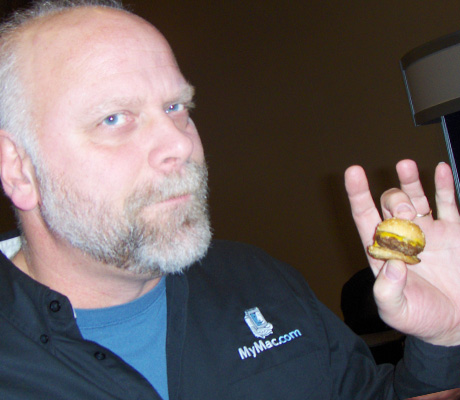
GarageBand Apple loops can take up a lot of space on one’s hard drive. Since many of us have machines with as little as 40 gigs (I myself do most of my GB stuff on a 933 G4 iBook), storage space can quickly become a problem. I found this hint at MacOSXHints but will detail it here for everyone.
IMPORTANT!!!!!
After doing the following, any open projects you have will not have loops as GB will not know where you put them until they’re reindexed. No guarentee that it will recover even after indexing.
DO NOT do this if you have any open projects without knowing EXACTLY which loops you used so you can recreate a particular project after. One other important thing to discuss. If you move your loops to another hard drive, that drive MUST be connected when you start up GB or GB won’t be able to find its loops. I use an 80 gig USB 2 buss powered drive (since mine is a portable and I like to use it where AC plugs aren’t always available), but you could also use an external FireWire drive or if you’re doing this from a desktop, another drive located in your enclosure.
1. Locate your loops in their default location. Typically this is in Library->GarageBand->Apple Loops, but can also be in Library->Application Support->GarageBand->Apple Loops.
2. Copy all your folders to another disk or partition (make sure you first have a seperate folder called Apple Loops or whatever) and then delete them from their original location (not to worry. if you screw up, put them back where they came from). Don’t delete the folder in the GarageBand library they came from, just its contents.
3. Delete all the contents in the Library->GarageBand->Apple Loops Index folder. Again, don’t delete the folder, just its contents. Remember that this will make your GB program not know where ANY of your loops are. This will also affect any open projects as GB will not know where they are. If you don’t delete these indexes, this trick won’t work.
4. Fire up GarageBand. Ignore the error messages. Drag and drop the folder you moved the loops to (on another disk or partition) GB’s loop area (you know, where the buttons are) and a dialog will open asking “Move to default location or only index?” Click “ONLY INDEX” or you’ll end up copying them back over to the Library folder again. GB will take its own sweet time reindexing and then you should be good to go.
5. Make sure you have Keyword Browsing set to “off” or they won’t show up.
6. You can do the same thing for any new loop collections you add by repeating this procedure. Just copy the individual collection over to your new loop folder on the other drive or partition and then drag and drop just that folder to GB after opening. Just remember to “Only Index”. No need to completely reindex your entire loop collection, just the new stuff.
Hope this helps and I’m giving all credit to macosxhints.com for this tip. No way I would have come up with this on my own!
Want to save even more space? Let’s move your “Instruments” folder as well. As compared to moving the loops, this one is a snap.
Drag and drop your Instruments folder to another partition. This folder is located in Library->Application Support->Garageband->Instrument Library.
Remember, once you have moved your Instruments or Apple Loops to another drive or partition, it must be mounted before starting up GarageBand. If you can’t remember or do this everytime, leave your stuff where Apple puts it!
No magic words or symbolic links or deleting indexes. Just move the Instrument Library to another disk or partition. Delete the original folder and start up GarageBand. It will tell you that it can’t find the Instrument Folder and ask you to either quit or locate the folder. Choose “Locate” and scroll through to the new location. GB starts up as usual and you’re all done. This will save you around 700 MB on a standard GB set. I’ve got lots of extra instruments though and it saved me almost 4 1/2 GB. On a 40 GB HD, that’s a lot! Good luck.
Between this trick and the one to Apple loops, I have gotten more than 20 GBs of stuff off my drive. Of course I have a LOT of extra collections in my GB library (something on the order of 15 to 20 thousand loops), so your milage may vary.


Leave a Reply
You must be logged in to post a comment.